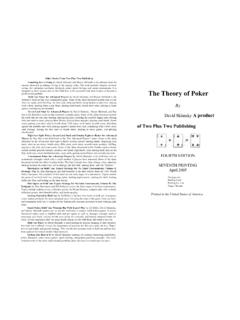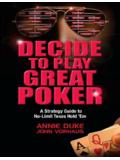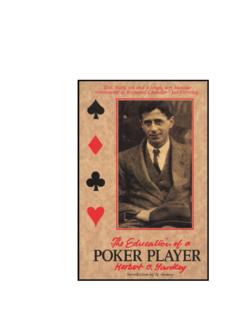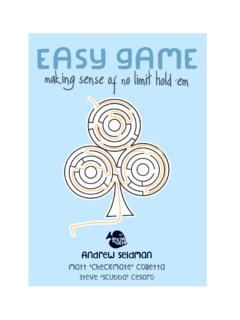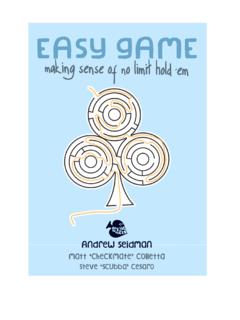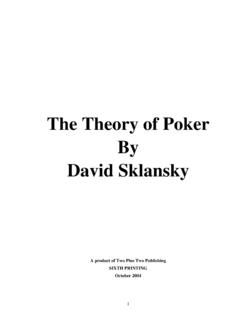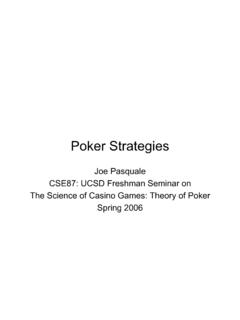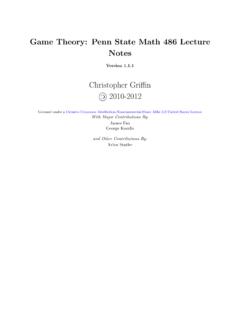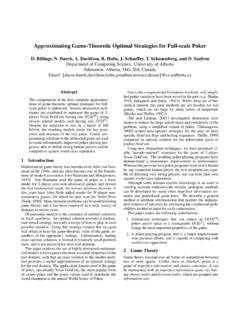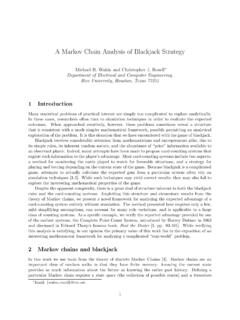Transcription of Poker Math
1 Poker math That Matters Simplifying the Secrets of No-Limit Hold em _____ By Owen Gaines Poker math That Matters Copyright 2010 by Owen Gaines Published by Owen Gaines All rights reserved. No part of this book may be reproduced or transmitted in any form or by any means without written permission from the author. To request to use any part of this book in any way, write to: To order additional copies, visit ISBN-13: 978-0-615-39745-0 ISBN-10: 0-615-39745-X Printed in the United States of America iv Table of Contents Acknowledgements .. viii About Owen Gaines .. x About this Book .. 1 Introduction .. 3 Why math Matters .. 3 Quiz .. 6 Measurements .. 9 Your Surroundings .. 9 Quiz .. 14 Thinking About Bets in No-Limit Hold'em .. 15 Quiz .. 17 Your Expectations .. 18 Quiz .. 22 Getting Started with Numbers .. 23 Working with Fractions, Percentages and Ratios.
2 23 Quiz .. 27 Expectation Value .. 29 Quiz .. 33 Hit the Deck .. 35 Counting Outs .. 35 Quiz .. 44 The 4/2 Rule .. 50 v Quiz .. 57 Putting It Together .. 59 Pot Odds .. 59 Quiz .. 64 Implied Odds .. 66 Quiz .. 69 World of the Unknown .. 71 Combinations .. 71 Quiz .. 78 Equity Versus a Range .. 81 Quiz .. 87 Which Bucks? .. 89 Quiz .. 92 Aggression .. 93 Bluffing .. 93 Quiz .. 97 Semi-bluffing .. 99 Quiz .. 106 Value-Betting .. 108 Quiz .. 113 At the Table .. 117 A Bit of Memory .. 117 Quiz .. 120 Chunking .. 121 Quiz .. 126 vi Set-Mining .. 127 Quiz .. 130 How Much to Bet?.. 131 Quiz .. 137 Balanced Play .. 139 Quiz .. 145 Summary .. 147 Champions .. 147 Appendix A .. 149 True EV and Evaluative EV .. 149 Appendix B .. 151 When Villain is +EV .. 151 Quiz Answers .. 153 Why math Matters Quiz Answers .. 153 Thinking About Bets in No-Limit Hold'em Quiz Answers . 154 Your Expectations Quiz Answers .. 155 Working with Fractions, Percentages and Ratios Quiz Answers.
3 157 The 4/2 Rule Quiz Answers .. 172 Pot Odds Quiz 174 Implied Odds Quiz Answers .. 176 Combinations Quiz Answers .. 178 Equity Versus a Range Quiz Answers .. 181 Which Bucks Quiz Answers .. 184 Bluffing Quiz Answers .. 186 Semi-Bluffing Quiz Answers .. 188 vii Value-Betting Quiz Answers .. 191 A Bit of Memory Quiz Answers .. 197 Chunking Quiz Answers .. 198 Set-Mining Quiz Answers .. 199 How Much to Bet Quiz Answers .. 200 Balance Quiz Answers .. 202 Glossary .. 205 viii Acknowledgements One of the most valuable things for a professional Poker player to have is friends who understand the game. Being a professional Poker player can make you feel like you re on an island. Having those friends really helps you feel more connected. Outside of that benefit, these friends have not only enriched my life, but have also taken a lot of time to help me develop my Poker game. I would not be the player I am today had it not been for their generous efforts.
4 I'd like to give special thanks to Steven Gallaher and Matt Hanes for patiently helping me learn the mathematics involved in analyzing Poker situations. Without them, it's doubtful I ever would have understood the mathematical concepts I present in this book. ix x About Owen Gaines I was always a bit fascinated with Poker and had read a small book or two on it long before I ever got a chance to try playing. Then, one day in 2004, a friend told me I could play Poker online. I decided to check it out. I knew very little about Poker at that point, but I bought a lot of books on limit hold'em, joined a Poker forum, and began to work very hard learning the game. I deposited $300, but I lost that rather quickly in the $.50/$1 limit hold em games. I decided to give Poker one more $300 attempt. That one stuck. I started to see the hard work pay off and built up a nice bankroll for the limit hold'em games. Since my hourly rate playing Poker was double that of my entry-level, nine-to-five job, I felt playing Poker professionally was the best option for me.
5 So, I started playing Poker professionally in the summer of 2005. From there, I played about a million hands of limit hold em and experienced good results. In early 2007, after a short break from the tables, I set aside $300 to mess around playing no-limit hold em. I had never really been interested in no-limit, but I had heard good things and decided to check it out. Fortunately all of my limit experience helped me transition to no-limit very easily. I started playing a lot of no-limit and worked my way up the stakes. I also found I really enjoyed playing no-limit. In 5 months, I turned the $300 into $30,000 and have been playing no-limit hold em as my main game ever since. As of the summer of 2010, I ve played about three million hands of Poker and have been playing professionally for over five years, providing the sole income for a family of five. Online xi Poker fits my family's lifestyle very well, and my family and friends have all adjusted to it.
6 I ve always enjoyed teaching and have taught in several different fields. In early 2009, I started offering personal Poker coaching and making Poker -training videos for I ve had a great time helping others develop their Poker skills, and I hope players continue to improve from my efforts in this book. 1 About this Book While I'm normally a quick l earner with new material, understanding how to play good Poker came to me a bit more slowly than I had hoped. Often times a concept would finally sink in and I would find myself wondering why I'd never seen someone explain it in a simpler manner. The mathematics of Poker was certainly one of those topics. I got a hold of every book on Poker math I could find, but none of them was helping me. Who cares about the odds to flop a straight flush or that 19,600 flops can come down? It seemed I was always left with a pile of numbers and no way to put the pieces together to really play great Poker .
7 I continued working on my own and probing for information; finally, the pieces started coming together. Understanding the mathematics of Poker has made a dramatic difference in my Poker game. This book is an attempt to help those who do not have a strong inclination to math or game theory but would really like to improve their Poker skills. I designed this material in an attempt to not leave any reader behind. I started with the most basic concepts and worked up from there. When finished with this book, you will be able to think clearly about no-limit hold em and analyze even some of the most complex decisions in the game. This will make you a force at the tables, and your wallet will thank you. Besides, as a friend of mine likes to say, winning is just way more fun! Because Poker is full of jargon, many times beginning players quickly get lost when reading a Poker book. To avoid this, every time I introduce a term I consider Poker jargon, I've put the font in bold so you know you'll be able to look up that term in the glossary at the back of the book.
8 2 Throughout this book, you will see hand notations for hole cards. When you see an "s" at the end of the hand (like 67s), this indicates the hand is suited. When you see an "o" at the end of the hand (like 67o), this indicates the hand is offsuit. If neither letter is present after the hand, this means it includes both suited and offsuit hands. I use a similar notation when describing the community cards. KTs2 would be a flop where the K and T are the same suit and the 2 is a different suit. When you see a "+" after a hand (like TT+), it indicates that hand and every other hand type that's stronger than it. So, TT+ indicates a pair of Ts, but also every pair higher than that (JJ, QQ, KK and AA). AT+ indicates AT but also every other non-pair A holding with a card higher than a T (AJ, AQ, AK). Also, I also like to use the term "Villain" to describe an opponent in a hand. So, of course, that makes us the "Hero". I'm also a firm believer in testing your comprehension of the material presented in a given chapter.
9 So, you'll find a quiz after every chapter. Take your time, and make sure you understand the material before moving on. If you'd like to practice a concept more, you can always grab a deck of cards and make your own scenarios. The better you grasp the concepts, the more thoroughly you'll be able to apply the concepts in real-time at the Poker table. Finally, you'll notice I m rounding numbers and using estimates in most of the math I present in this book. This book is designed for practical use at the Poker table. My goal is not precision three places to the right of the decimal. 3 Introduction Why math Matters Poker is a seemingly simply game on the surface. But, as many people coming to learn the game have discovered, it s actually quite complex. However, every complex decision in Poker can really be boiled down to two things, the two keys to good Poker . So, without further ado, here are the two keys to good Poker . 1.
10 Accurate assumptions 2. Making the best decision It s so simple, but it really defines the decision process for players. This concept is the foundation of anything I do with Poker and will really help beginners and experts alike put the game in perspective, create goals and analyze Poker situations. Let s begin by defining these two keys. First, let s look at accurate assumptions. I find it easiest to break this into two sections. One is concerning our opponent s range of hands, and the other is how he will play that range. This key uses deductive reasoning to determine what hands are likely for the opponent to have. Players like to call this hand-reading . This key also uses deductive reasoning to predict what decisions (like betting, calling or folding) the opponent will make with those hands. The second key is making the best decision. We ll simply say this key involves making the decision that makes the most money. After we ve determined our assumptions in the first key, the second key comes along with mathematics to show us what play makes us the most money on average.
